|
|
|
Sort Order |
|
|
|
Items / Page
|
|
|
|
|
|
|
| Srl | Item |
| 1 |
ID:
163241
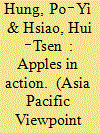

|
|
|
|
|
| Summary/Abstract |
This essay outlines the symbolic and material transformation of mountain agriculture in Taiwan by tracing the historical trajectories of temperate fruit production, and of apple growing in particular. Specifically, we look at the area of Lishan, a major production centre for apples and other temperate fruits in Taiwan's Central Mountain Range in order to explore the relationship between the mountain agriculture and the politics of territorialisation. Focusing on the post‐war era, we argue that the development of mountain agriculture in Taiwan, and upland fruit growing in particular, has operated as a ‘more‐than‐human political technology’. The territory of Lishan is not just a passive geographical space, but engaged in a process of becoming, which re‐makes the mountain areas of Taiwan into ‘apple zones’ both spatially and socially. The spatial dimension centres on processes of political territorialisation, economic deterritorialisation and combined reterritorialisations whereby apple plantations have transformed the landscape from one focused on strategic politics to one embedded within development and market frameworks which entail their own particular forms of politics. The social dimensions are centred on the politics of forging connections among different elements circulating through the mountain areas of Taiwan, including apples, soldiers, transport infrastructures and agricultural policies.
|
|
|
|
|
|
|
|
|
|
|
|
|
|
|
|
| 2 |
ID:
169946
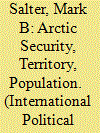

|
|
|
|
|
| Summary/Abstract |
Canada's policies to assert and maintain sovereignty over the High Arctic illuminate both the analytical leverage and blind spots of Foucault's influential Security, Territory, Population (2007) schema for understanding modern governmentality. Governmental logics of security, sovereignty, and biopolitics are contemporaneous and concomitant. The Arctic case demonstrates clearly that the Canadian state messily uses whatever governmental tools are in its grasp to manage the Inuit and claim territorial sovereignty over the High North. But, the case of Canadian High Arctic policies also illustrates the limitations of Foucault's schema. First, the Security, Territory, Population framework has no theorization of the international. In this article I show the simultaneous implementation of Canadian security-, territorial-, and population-oriented policies over the High Arctic. Next, I present the international catalysts that prompt and condition these polices and their specifically settler-colonial tenor. Finally, in line with the Foucauldian imperative to support the “resurrection of subjugated knowledges” (Foucault 2003, 7), I conclude by offering some of the Inuit ways of resisting and reshaping these policies, proving how the Inuit shaped Canadian Arctic sovereignty as much as Canadian Arctic sovereignty policies shaped the Inuit.
|
|
|
|
|
|
|
|
|
|
|
|
|
|
|
|
| 3 |
ID:
181404
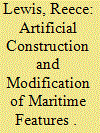

|
|
|
|
|
| Summary/Abstract |
Coastal states create and modify maritime features. The law of the sea recognizes the existence of artificial islands, installations, and structures. It also defines islands and low-tide elevations as “naturally formed” areas of land. Thus far, however, these concepts have been ambiguously interpreted and applied. This article puts forward a clearer approach. It reemphasizes some of the fundamental principles of international law by demonstrating that a feature’s capability of sovereign appropriation should determine its legal treatment.
|
|
|
|
|
|
|
|
|
|
|
|
|
|
|
|
| 4 |
ID:
090218
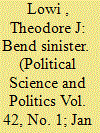

|
|
|
|
|
| Publication |
2009.
|
| Summary/Abstract |
In the construction of a state, Legitimacy is everything and nothing. Students of the state have taken a wrong turn by following Max Weber's formulation of the ideal typical state as "a human community that (successfully) claims the monopoly of the legitimate use of physical force within a given territory "(Gerth and Mills 1946, 78) Although an ideal type can be helpful, the concept can be frozen as an absolute.
|
|
|
|
|
|
|
|
|
|
|
|
|
|
|
|
| 5 |
ID:
079470
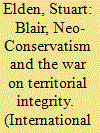

|
|
|
|
|
| Publication |
2007.
|
| Summary/Abstract |
This essay uses the war on Iraq and in particular the legal advice of the British Attorney General to explore two tensions.1 The first is between Blair's foreign policy with its 'ethical dimension' and call for humanitarian intervention by the international community and the project of the neo-conservatives in the US. The second is in the notion of territorial integrity, which means both the idea of territorial preservation and that within this territory a state is sovereign. The war on Iraq, which violated territorial sovereignty, was fought against a backdrop of preserving the existing territorial settlement, especially regarding the Kurds. While Blair and the neo-conservatives share an argument against territorial sovereignty as an unconditioned absolute, and hold a belief in the need for territorial stability, their positions differ on the mechanisms needed. Blair strove for an internationalist position; the neo-conservatives argue for US exceptionalism. Ultimately though, faced with a decision, Blair joined the US in violating a sovereign state's territorial integrity without international support
|
|
|
|
|
|
|
|
|
|
|
|
|
|
|
|
| 6 |
ID:
080824


|
|
|
|
|
| Publication |
2008.
|
| Summary/Abstract |
Contentious issues are important sources of militarized conflict. This article advances an issue-based approach to world politics, focusing on disagreements over territory, maritime zones, and cross-border rivers. We characterize militarized conflict and peaceful techniques as substitutable foreign policy tools that states can adopt to resolve disagreements over issues, and we present hypotheses to account for issue management based on issue salience and recent interaction over the same issue. Empirical analyses reveal that states are more likely to use both militarized conflict and peaceful methods when the issue at stake is more salient, both when the general issue type is considered more salient and when the specific issue under contention has greater within-issue salience. Recent issue management also plays an important role, as histories of both militarized conflict and failed peaceful settlements increase pressure to take further action to settle the issue
|
|
|
|
|
|
|
|
|
|
|
|
|
|
|
|
| 7 |
ID:
094592
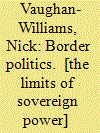

|
|
|
|
|
| Publication |
Edinburgh, Edinburgh Unitversity Press, 2009.
|
| Description |
ix, 190p.
|
| Standard Number |
9780748637324
|
|
|
|
|
|
|
|
|
|
|
|
Copies: C:1/I:0,R:0,Q:0
Circulation
| Accession# | Call# | Current Location | Status | Policy | Location |
| 054844 | 320.12/VAU 054844 | Main | On Shelf | General | |
|
|
|
|
| 8 |
ID:
088766
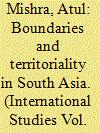

|
|
|
| 9 |
ID:
138241
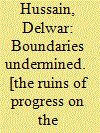

|
|
|
|
|
| Publication |
New Delhi, Oxford University Press, 2013.
|
| Description |
xvii, 187p.Hbk
|
| Standard Number |
9780199459407
|
|
|
|
|
|
|
|
|
|
|
|
Copies: C:1/I:0,R:0,Q:0
Circulation
| Accession# | Call# | Current Location | Status | Policy | Location |
| 058200 | 320.125492054/HUS 058200 | Main | On Shelf | General | |
|
|
|
|
| 10 |
ID:
178565
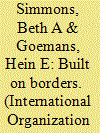

|
|
|
|
|
| Summary/Abstract |
The Liberal International Order is in crisis. While the symptoms are clear to many, the deep roots of this crisis remain obscured. We propose that the Liberal International Order is in tension with the older Sovereign Territorial Order, which is founded on territoriality and borders to create group identities, the territorial state, and the modern international system. The Liberal International Order, in contrast, privileges universality at the expense of groups and group rights. A recognition of this fundamental tension makes it possible to see that some crises that were thought to be unconnected have a common cause: the neglect of the coordinating power of borders. We sketch out new research agendas to show how this tension manifests itself in a broad range of phenomena of interest.
|
|
|
|
|
|
|
|
|
|
|
|
|
|
|
|
| 11 |
ID:
103750
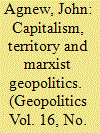

|
|
|
|
|
| Publication |
2011.
|
| Summary/Abstract |
This response traces the importance of ideas and politics versus economic determinism in developing a critical approach to geopolitics particularly in questioning the necessary relationship between territory and capitalism. From this perspective, and contra to "Marxist geopolitics," spatial-political form does not follow from economic function. To argue so leads to an intellectual and political dead end.
|
|
|
|
|
|
|
|
|
|
|
|
|
|
|
|
| 12 |
ID:
161708
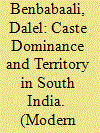

|
|
|
|
|
| Summary/Abstract |
This article argues that taking territory into account is essential to understand the change in the scale and nature of caste dominance in contemporary India. The demonstration is based on an analysis of the socio-spatial trajectories of the Kammas—a dominant caste from Coastal Andhra, where they continue to own most of the land, even though they have migrated in large numbers towards the interior and southern regions of the Indian peninsula, both to newly irrigated areas and to the cities. The key positions they occupy in the politics and economy of Andhra Pradesh confer upon them a hegemonic character. However, this hegemony is threatened by the growing resistance of Dalits to caste and class oppression, while Kamma cultural domination, long contested in Telangana, is now challenged by the formation of the new state.
|
|
|
|
|
|
|
|
|
|
|
|
|
|
|
|
| 13 |
ID:
090492
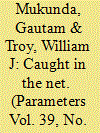

|
|
|
| 14 |
ID:
157220
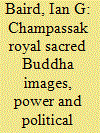

|
|
|
|
|
| Summary/Abstract |
What is the relationship between Buddha images and the legitimization of political power over space? What understandings exist amongst royals concerning regaining spatial power associated with Buddha images? This article considers these questions with a particular focus on the Champassak Royal House, a royal family that was originally spatially constituted through the territorial control it had over present-day southern Laos and some neighbouring areas. To do this, the article draws upon two case studies, one centred on an important Buddha image in the 18th century, the other more contemporary and linked to Buddha images and exiled members of the Champassak Royal House. Buddha images have long played an important role in constituting and defining sacred geographies, and thus political power, in Champassak, as has similarly been the case in other parts of mainland Southeast Asia.
|
|
|
|
|
|
|
|
|
|
|
|
|
|
|
|
| 15 |
ID:
128563
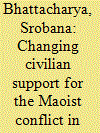

|
|
|
|
|
| Publication |
2013.
|
| Summary/Abstract |
Prolonged domestic political conflicts change over time. The Maoist conflict in India which began in the late 1960s is one such conflict. Over time, the 'old' Maoist conflict has become a 'new' Maoist conflict. Important changes have occurred both in the macro and micro processes of the conflict. Some of these changes include the strategic relocation of the Maoist bases, a shift in the class character of the conflict, the nature of civilian support, and the rebels' methods of operation. While in the 1960s, the conflict was involved in land redistribution with the aim of annihilating class enemies, the recent conflict focuses on caste identities. In addition, it is intrinsically linked with territorial control and local political competition. This has automatically led the Maoists to become involved with local criminal networks and also local business networks based. This involvement has led to financial resources for the conflict. Furthermore, it has forced the local population to become linked with the conflict. Studying these changes is important, especially for counterinsurgency policies.
|
|
|
|
|
|
|
|
|
|
|
|
|
|
|
|
| 16 |
ID:
187367
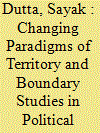

|
|
|
|
|
| Summary/Abstract |
Boundary studies as a sub-discipline of political geography has undergone several momentous transformations during its evolution. The classical period was predominantly concerned with demarcating the ideal boundary for achieving a stable geopolitical order. This changed during the latter part of the 20th century when scholars began contemplating the role of boundary as a social force. Postmodern understanding of boundaries concerned itself with questions of identity and the narratives of boundary. The focus on territory and territoriality marks another departure from contractual boundary between states to a more cultural notion. In stark contrast to the spatial perception of boundary and territory stands the stream of literature exploring social boundaries investigating the symbolic boundaries that facilitate the social differentiation between various groups of people. The present study comprehensively reviews the three intertwined branches and indicates the need to fuse these traditions and offer suggestions on how to do so. The article also contemplates necessary adaptations to the field going forward.
|
|
|
|
|
|
|
|
|
|
|
|
|
|
|
|
| 17 |
ID:
178651


|
|
|
|
|
| Summary/Abstract |
Many scholars examine the relationship between climate variability and intrastate conflict onset. While empirical findings in this literature are mixed, we know less about how climate changes increase the risks for conflicts between countries. This article studies climate variability using the issue approach to world politics. We examine whether climate variability influences the onset and militarization of interstate diplomatic conflicts and whether these effects are similar across issues that involve sovereignty claims for land (territory) or water (maritime, river). We focus on two theoretical mechanisms: scarcity (abundance) and uncertainty. We measure these concepts empirically through climate deviation (e.g. droughts/floods, heat waves/cold spells) and climate volatility (greater short-term variance in precipitation/temperature). Analyses of issue claims in the Western Hemisphere and Europe (1901–2001) show that greater deviations and volatility in climate conditions increase risks for new diplomatic conflicts and militarization of ongoing issues and that climate change acts as a trigger for revisionist states.
|
|
|
|
|
|
|
|
|
|
|
|
|
|
|
|
| 18 |
ID:
046418
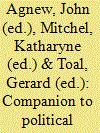

|
|
|
|
|
| Publication |
Malden, Blackwell Publishing, 2003.
|
| Description |
xii, 494p.
|
| Standard Number |
0631220313
|
|
|
|
|
|
|
|
|
|
|
|
Copies: C:1/I:0,R:0,Q:0
Circulation
| Accession# | Call# | Current Location | Status | Policy | Location |
| 046327 | 320.12/AGN 046327 | Main | On Shelf | General | |
|
|
|
|
| 19 |
ID:
109037
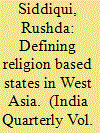

|
|
|
|
|
| Publication |
2011.
|
| Summary/Abstract |
As speculation grows about the possibility of a turbulent Egypt, Libya, Tunisia or even Algeria drifting from demanding democracy and political liberalism to establishing an Islamic state, this article, by attempting to define religion based states would want to form a background to the speculations. The author would like to point out that the coming power by a political party with a religious affiliation would not make the states into Islamic States. As a matter of fact, given the kind of external and internal forces at play in West Asia and North Africa, it would not be possible for any country to redefine the basis of its identity, let alone transform itself into a theocratic state in classical parlance. With the close of the Second World War and the establishment of nation-states in the new world order, two deviant states were created from Asia. Israel and Pakistan were created taking religion, instead of geography or history of the land or ethnicity or race or existing socio-political structures, for the foundational basis of their identity. It heralded a new era for history. These states were going to be yardsticks for later day religion based socio-political movements. If these movements were going to gain power, they would need to conform to the newly set patterns for religion based states. Re-creating a theocratic state based on classical historical lines, is no longer an option.
|
|
|
|
|
|
|
|
|
|
|
|
|
|
|
|
| 20 |
ID:
137821
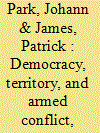

|
|
|
|
|
| Summary/Abstract |
Democracy and territory are two of the most important factors that affect conflict and war. Yet no research design looks directly at a possible interaction between these two variables to influence occurrence of armed conflict. This study seeks to answer the following question: “How do two democracies behave when a contentious issue such as territory arises as the source of conflict between them?” Results based on Militarized Interstate Dispute data from 1920 to 1996 produce the conclusion that the pacifying effect of democracy stands up for both territorial dyads and non-territorial ones in spite of the imperatives toward militarization created by territorial conflict. However, territory of high salience still appears to increase the likelihood of armed conflict between two democracies.
|
|
|
|
|
|
|
|
|
|
|
|
|
|
|
|
|
|
|
|
|